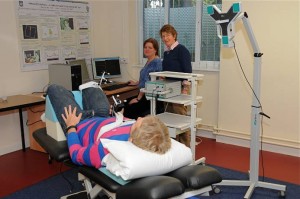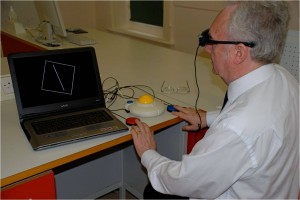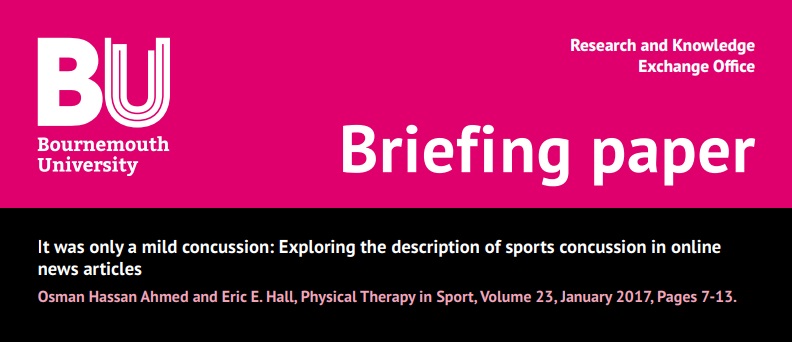“Assessing agreement between kinaesthesis, visual perception and body imagery” is a collaborative study bringing together expertise from BU and AECC.
The project aims to assess whether there are differences in perception and body image between those with chronic low back pain and controls. To do this we are using a variety of measures (outlined below) and it is hoped that the insight we gain from a group of people with chronic pain we can expand the techniques to other populations where body image may become distorted. These include for example those with complex regional pain syndrome, or following an amputation and for those with eating disorders.
The project is being conducted by Dr. Carol Clark, Gill Glasgow (BU) and Dr. Neil Osborne (AECC) along with Dr. Sharon Docherty (AECC) in the AECC Experimental Research Facility. Professors Ahmed Khattab (BU) and Jeff Bagust (AECC & BU) are also involved.
The Kinaesthetic Assessment Bench (KAB)
Lumbar spine kinaesthesis is assessed by using an ultrasound motion analysis system to measure how accurately the subject can reposition their lower body on a motorised bench.

Lower body repositioning
The Computerised Rod and Frame Test (CRAFT)
CRAFT assesses an individual’s perception of vertical using a specialist computerised software system. The test has been employed in studies investigating the perception of vertical in those with acute and chronic neck pain.

The CRAFT in use
The Body Motor Imagery Test (Recognise TM)
The aim of this test is to assess the activation of cortical networks in relation to body laterality with minimal limb movement. This test employs simple computerised software and has been employed in studies to assess and treat body imagery impairments in those with pain.
The Assessment of Body Image Cognitive Distortions (ABCD)
The ABCD aims to assess cognitive distortions related to body image perception.
Seed corn funding was awarded from HSC in March 2012. This small grant has enabled us:-
– To investigate new concepts in relation to body image and perception
– To record data using the tools in order to establish published results. We are in the process of carrying out the initial data collection
– To develop in-depth knowledge about body image and perception
– To establish contact with researchers at the University of South Australia and Imperial College London.
– To offer two undergraduate research dissertation projects
– To establish interprofessional collaborative working between CC, GG, NO, SD, AK and JB.
– To enable closer collaboration between BU and one of its partner organisations AECC.
For further information please do not hesitate to contact: Carol Clark (HSC), Neil Osborne (AECC) or Sharon Docherty (AECC)
Anyone wishing to take part in the study, please contact Dr Sharon Docherty (SDocherty@aecc.ac.uk) for more details.
 Our BU briefing papers are designed to make our research outputs accessible and easily digestible so that our research findings can quickly be applied – whether to society, culture, public policy, services, the environment or to improve quality of life. They have been created to highlight research findings and their potential impact within their field.
Our BU briefing papers are designed to make our research outputs accessible and easily digestible so that our research findings can quickly be applied – whether to society, culture, public policy, services, the environment or to improve quality of life. They have been created to highlight research findings and their potential impact within their field.












 REF Code of Practice consultation is open!
REF Code of Practice consultation is open! BU Leads AI-Driven Work Package in EU Horizon SUSHEAS Project
BU Leads AI-Driven Work Package in EU Horizon SUSHEAS Project Evidence Synthesis Centre open at Kathmandu University
Evidence Synthesis Centre open at Kathmandu University Expand Your Impact: Collaboration and Networking Workshops for Researchers
Expand Your Impact: Collaboration and Networking Workshops for Researchers ECR Funding Open Call: Research Culture & Community Grant – Apply now
ECR Funding Open Call: Research Culture & Community Grant – Apply now ECR Funding Open Call: Research Culture & Community Grant – Application Deadline Friday 12 December
ECR Funding Open Call: Research Culture & Community Grant – Application Deadline Friday 12 December MSCA Postdoctoral Fellowships 2025 Call
MSCA Postdoctoral Fellowships 2025 Call ERC Advanced Grant 2025 Webinar
ERC Advanced Grant 2025 Webinar Update on UKRO services
Update on UKRO services European research project exploring use of ‘virtual twins’ to better manage metabolic associated fatty liver disease
European research project exploring use of ‘virtual twins’ to better manage metabolic associated fatty liver disease